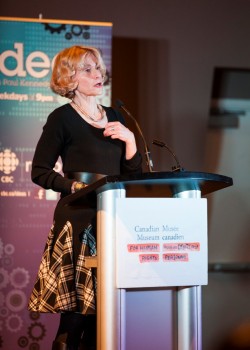‘The capabilities approach’
When people think of human rights, they naturally think of things like free speech and freedom of religion. Renowned philosopher Martha Nussbaum (University of Chicago Law School) has traveled through the developing world, and she believes that a poor woman living in India, trying to support herself and her family, needs more than that. She needs not just freedom from oppression by her government, but also the resources necessary to pursue a fulfilling life. Professor Nussbaum calls this view “the Capabilities Approach” to human rights. And on Friday October 25, she presented this view to a sold-out audience at the new Canadian Museum of Human Rights.
Professor Nussbaum’s lecture was the second in a series titled “Fragile Freedoms: The Global Struggle for Human Rights”. The series is organised by the University of Manitoba’s Centre for Professional and Applied Ethics, in conjunction with the Museum, and Ideas, CBC’s programme dedicated to contemporary thought. There will be eight lectures in the series concluding in May 2014 with a talk by Germaine Greer. All will be broadcast on Ideas; Nussbaum’s lecture will air on Ideas on Oct. 31.
The Capabilities Approach was developed by Professor Nussbaum in conjunction with several others, including Amartya Sen, who was awarded the Nobel Prize in Economics for his work on international development. By challenging more traditional conceptions of human welfare, the approach has stirred controversy both within academic circles and among those who work on international development. Professor Nussbaum provided a list of ten central capabilities that are necessary to a flourishing life, including bodily integrity, control over one’s environment, and the opportunity for leisure and play. She says that we all must do what we can to ensure that people everywhere in the world have the ability to realise these capacities in their own way.
“Professor Nussbaum did what a philosopher is supposed to do,” says Ethics Centre Director Arthur Schafer. “She challenged our assumptions about the world, and she helped inspire us to make the world a less unjust place for its inhabitants.” Professor Schafer says he is confident that future lectures in the series will be equally exciting, and he encourages people to visit the series’ website for information about future lectures and to obtain tickets: fragilefreedoms.com
About Fragile Freedoms
The University of Manitoba’s Centre for Professional and Applied Ethics, together with the Canadian Museum for Human Rights and The Canadian Broadcasting Corporation are bringing some of the world’s preeminent human rights thinkers to Winnipeg for an original lecture series. The series, which will take place in the Museum, is being organized to celebrate the Museum’s forthcoming opening.
Tickets to many lectures are sold-out, so visit the website today to order yours before to it’s too late.
Listen to A.C. Grayling’s series opening lecture on Ideas







